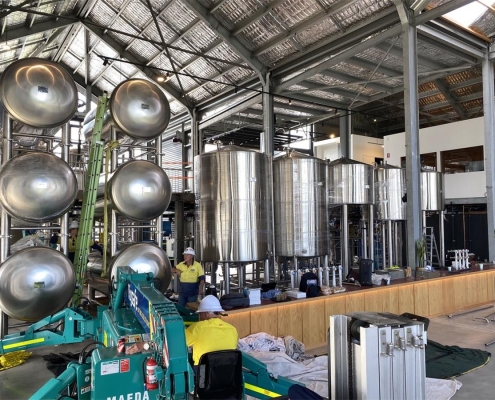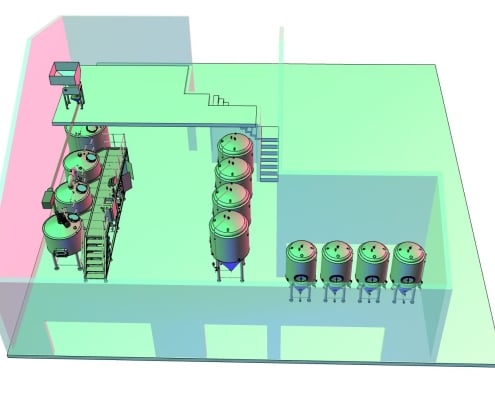Start up a microbrewery in US
/Update Jaunary 16, 2023 / By YoLong Brewtech
Start up microbrewery is exciting work. Something that needs to concern every brewery especially if they are new is the information as experience always outshines compared to any new startup so the best way to tackle it is through information. However, even after having the information there are many major issues that are faced by startup micro/craft brewery in the US. It is always better to know about these issues prior head so you are able to deal with them when they occur. Some of the issues are as follows:
If you’re thinking of start up a microbrewery, now is the time to do it. The popularity and demand for beer is growing, making it an exciting and profitable business to get into. From microbreweries to cideries, distilleries and wineries, there’s a brewery for every taste and budget.
Start Today
Estimating the cost of brewery equipment
First question, What Is A Microbrewery?
A microbrewery is a small-scale brewery that produces a limited amount of beer. Microbreweries are typically independently owned and operated, and they focus on producing high-quality, artisanal beers. Unlike large-scale breweries that produce mass-market beers, microbreweries produce a wide range of styles and flavors, often using unique ingredients and brewing techniques.
Microbreweries are also known for their strong ties to their local communities. They often source their ingredients from local farms and suppliers, and they sell their beer directly to local bars, restaurants, and stores. This helps to support local economies and create a sense of community around the brewery.
Things To Know Before Starting A Microbrewery Business In The US
Here are six essential things to do before you start a microbrewery business in the United States.
Microbrewery Business Plan
If you’re considering starting a microbrewery, a well-written business plan is critical to your success. In this article, we’ll explore the key elements of a microbrewery business plan and offer tips for developing a strategy that will help you achieve your goals.
- Choosing a Brewery Name
Choosing a name for your brewery is a crucial first step in building your brand identity. Your brewery name should be memorable, reflective of your values and brand identity, and easy to pronounce and remember. Consider conducting a name brainstorming workshop to come up with ideas and gather feedback from others.
Once you’ve settled on a name, it’s important to protect your intellectual property with a trademark. This will help you to prevent others from using your name or logo, which could damage your brand and reputation.
- Developing a Business Plan
A well-written business plan is essential for any microbrewery. Here are the key elements you should include in your plan:
- Operations Plan: The operations plan should outline how you plan to produce your beer and manage your brewery. This should include a detailed overview of your brewing process, supply chain management, and quality control measures. By creating a solid operations plan, you can ensure that your beer is of the highest quality and that your brewery runs efficiently.
- Financial Plan: The financial plan should include projections for revenue, expenses, and cash flow. This should include a detailed analysis of startup costs, ongoing expenses, and revenue streams. By creating a solid financial plan, you can ensure that your brewery is profitable and sustainable over the long term.
Brewery Equipment Cost
The cost of launching a microbrewery, on the other hand, varies depending on the size of the brewery, output levels, and location. Microbreweries have substantial startup expenses compared to many other small enterprises. Dealing with unexpected fees and charges is one of the most difficult aspects of starting a brewery. Major expenses include licenses, rent and startup inventory. In comparison, brewery equipment such as kettles, boilers, kegs, cooling systems, storage tanks, fermentation tanks, and filters only cost around $100,000.
Throughout the startup phase, your spending will not be high as a microbrewery typically requires less equipment and space. You can produce 20 barrels per year and still have a good profit margin. Many of the operational expenditures of this business are changeable, depending on the area, the size of the company, and market fluctuations. The key expenditures will include paying for brewing ingredients (such as malt, yeast, and hops), utilities (such as power, gas, and sewage), and ongoing cleaning and repair charges, which will include frequently acquiring cleaning equipment.
When it comes to distribution, a microbrewery usually uses a three-tier structure. The brewer utilizes a distributor to sell alcohol to local pubs, grocery shops, liquor stores, and other businesses under a three-tier structure. Customers are subsequently sold to by these customer-facing companies. Microbrews are available year-round, and many brewers develop special seasonal offers. Learn more at Probrewery-YoLong!
Microbrewery Licenses and Permits
A Beer license is required to lawfully own and run a brewery or any other company that manufactures or sells alcohol. Because of the direct link between alcohol production and sales, you can expect to be subject to a slew of state rules and legislation. The alcohol sector is extensively regulated at both the federal and state levels, with state regulations having a lot of influence over how you may conduct your brewery.
You can apply for a limited license, which permits you to sell particular types or amounts of alcohol, or a complete license, depending on your manufacturing and serving needs. Make sure to look into the unique criteria for your brewery’s location. Although each state has its unique set of rules for starting and running a brewery, there are certain essential duties and legal documentation that you’ll need to get.
Start Up Microbrewery Location
Location is very important for microbreweries. It must be in a proper area with enough space for your operation and well-equipped to manage the special needs of alcoholic beverage production. You’ll also need room to store beverages, run the company, and entertain artists, among other things.
When starting your own microbrewery, it’s important to be mindful of the location. A good location for your microbrewery should have enough room for your beer production, as well as adequate parking and access to nearby markets. Locate near major highways or neighbourhoods that see a lot of foot traffic so customers can easily find it.
If you pick a structure that does not meet your demands, you will not be able to manage a profitable brewery. The most critical consideration, like with any company, is safety. Make sure the structure you pick will pass safety inspections and allow you to do business safely.
Start Today
Estimating the cost of brewery equipment
Microbrewery Distributors
Once you’ve started producing beer at your microbrewery, expanding your distribution network is essential to reach more customers and increase your revenue. In this article, we’ll explore some tips for successfully expanding your microbrewery distribution network.
- Understanding the Three-Tier System
The U.S government has put a three-tier system in place for alcohol distribution. Producers are at the first level, followed by wholesale merchants who then sell their wares to retailers, who ultimately sell to the end-consumer. It’s important to understand this system and how it affects your distribution strategy.
- Choosing a Distributor
Choosing the right distributor is critical to your success in expanding your distribution network. Look for a distributor that has experience working with craft breweries and that understands your brand and target market. Your local brewing guild or association can help you find the right distributor for your needs.
When negotiating with a distributor, consider the terms of the deal carefully. Most states have rules protecting the provider-distributor sales contract, so it’s important to think about your present and future needs before signing an agreement.
- Building Relationships
The beer business is built on relationships, so it’s important to build strong relationships with your distributors, retailers, and customers. Take the time to get to know your distributors and their sales teams, and work closely with them to develop effective marketing and sales strategies.
- Investing in Your Team
As you expand your microbrewery distribution network, it’s important to invest in your team. Hiring the right employees and building a strong company culture can help you to attract and retain top talent. A successful microbrewery requires a team that is passionate about brewing and dedicated to delivering high-quality beer.
- Choosing Your Space
When expanding your microbrewery, you’ll need to choose the right space for your needs. You can buy an existing restaurant, build your own space, or lease existing space that was previously used as a different type of establishment. Consider the size of the space, the number of employees you’ll need, and the location before making a decision.
In conclusion, Expanding your microbrewery distribution network requires careful planning and execution. By understanding the three-tier system, choosing the right distributor, building strong relationships, investing in your team, and choosing the right space, you can successfully expand your distribution network and reach more customers. Remember to stay flexible and open to adjustments as you go along, and seek advice and guidance from industry experts and mentors as needed.
ARE YOU HAVE BREWING QUESTIONS?
WE CAN HELP!
Brewery Marketing
Marketing is a crucial aspect of any business, including microbreweries. In this article, we’ll explore some key marketing strategies that can help you to promote your brewery and reach more customers.
- Conduct Market Research
Before you start promoting your brewery, it’s important to conduct market research to identify your target audience and potential markets. This will help you to develop a marketing strategy that is tailored to the needs and preferences of your customers.
- Invest in Digital Advertising
Digital advertising is one of the most effective ways to reach potential customers. Consider investing in targeted online ads that can reach a specific audience based on demographics, interests, and location. This can be a cost-effective way to promote your brewery and increase your sales.
- Utilize Social Media
Social media platforms such as Facebook, Instagram, and Twitter can be powerful tools for promoting your brewery. You can use these platforms to share updates about your products, events, and promotions, and to engage with your customers. Consider running social media campaigns that encourage customers to share photos or reviews of your beer.
- Participate in Local Festivals
Participating in local festivals can be a great way to promote your brewery and reach new customers. Look for festivals that allow brewers to market their products and participate in music, entertainment, or food events. This can be a great way to build brand awareness and generate buzz around your brewery.
- Host Launch Parties
Hosting launch parties can be a great way to introduce your beer to new customers and generate excitement around your brewery. Consider hosting launch parties at your brewery or at local bars or restaurants. This can be a great way to build relationships with potential distributors and retailers, as well as to connect with your customers.
In conclusion, Marketing is an essential aspect of running a successful microbrewery. By conducting market research, investing in digital advertising, utilizing social media, participating in local festivals, and hosting launch parties, you can promote your brewery and reach more customers. Remember to be creative and flexible in your approach, and to seek advice and guidance from industry experts and mentors as needed.
When starting a brewery, you can expect to spend a lot of time cutting costs and working hard. However, the rewards of running a successful brewery are enormous. Although beer has high-profit margins, with solid financial management and marketing savvy you can transform a competent brewery into an enterprise that thrives through tough economic times.
You’re well on your way to making your idea a reality now that you know the basics of how to establish a brewery. There are several online resources and tools accessible to you, as well as many industry associations willing to share their knowledge and experiences. Starting your brewery may be both thrilling and intimidating at the same time, especially if you’re new to the craft beer market. However, you have the basis for long-term growth if you have well-thought-out and documented strategies, procedures, and reporting in place.
BREWERY BREWING CONSULTING
If you are not a professional brewer and are considering making the transition from home brewing to nano brewery, it is a good idea to find a professional brewery consultant to help you through the first 30-90 days.
The Brewery Consultant will:
- 1:Help expand your recipes.
2:Learn how the Nano brewing system works
3:Convince potential clients that you are on the right track.
4:Be your most reliable “brewery problem solver” partner
5:Make your commercial brewery a reality in the near future
if you want to start your own brewing business. My company YoLong has been working on microbrewery & beverage projects since 2004, we can give you any assistance from 0 to turnkey. Check out the professional brewing consulting services we offer.
Interested in learning more about Brewing Systems including additional details and pricing information? Please use the form below to contact us!






